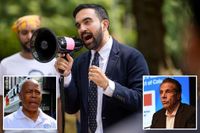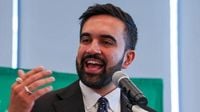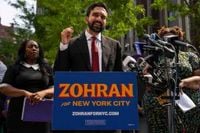New York City’s mayoral race is shaping up to be one of the most contentious and closely watched in recent memory, with Assemblyman Zohran Mamdani, a proud member of the Democratic Socialists of America, holding onto a lead in the polls despite mounting criticism from both sides of the political spectrum. The latest survey, conducted on August 11, 2025, by Gotham Polling & Analytics for the AARP, paints a complicated picture of voter sentiment, highlighting both Mamdani’s enduring appeal and the growing unease among some New Yorkers about his policy proposals and political alliances.
The poll, which surveyed 1,400 likely voters across the five boroughs, found the electorate almost perfectly split on Mamdani himself. According to the results published by the New York Post, 47% of respondents reported a favorable view of Mamdani, while an equal 47% said their opinion was unfavorable. This polarization is a marked shift from earlier in the campaign, when Mamdani enjoyed more positive ratings, with his unfavorability previously hovering in the 30% to low-40% range. Yet, despite this slide, he remains the clear frontrunner, commanding nearly 42% support in the crowded field.
Trailing Mamdani is former Governor Andrew Cuomo, who, after being soundly defeated by Mamdani in the Democratic primary nearly two months ago, is now running as an independent. Cuomo has managed to secure 23% support, but according to Gotham Polling & Analytics president Stephen Graves, "Cuomo has the best path of the challengers, but even in a hypothetical one-on-one in an election that often favors lower-turnout, older electorates, he still trails by double digits." Graves added, "A disciplined persuasion campaign could still make this a race."
Republican nominee Curtis Sliwa, founder of the Guardian Angels, is also in the running, polling at 16%. Sliwa, never one to mince words, has been especially vocal in his opposition to Mamdani. In a recent interview with political commentator Alan Skorski, Sliwa described Mamdani as an "America-hating, cop-bashing, antisemitic socialist" and warned of a "radical Marxist takeover" if Mamdani were to win the mayoralty. Sliwa argued that Mamdani’s platform—which includes proposals to defund the police, impose strict rent controls, and launch city-run grocery stores—would devastate New York’s economy and endanger its Jewish community.
"Mamdani has made it clear he wants to defund the police, impose rent control that would collapse our housing market, and even open government-run grocery stores," Sliwa asserted, likening the proposals to failed Soviet-era policies. He also took aim at Mamdani’s connections to progressive activists, including Linda Sarsour, and criticized his past involvement with Students for Justice in Palestine, particularly Mamdani’s refusal to denounce the "Globalize the Intifada" slogan. Sliwa, who has built his campaign around public safety, recalled the Guardian Angels’ patrols during the Crown Heights riots and urged the city’s Jewish community to "stop relying on others for protection."
On housing, Sliwa has a markedly different approach. He has pledged to convert thousands of vacant properties across the city into affordable housing units and to eliminate congestion pricing and traffic speed cameras, which he dismissed as "nothing more than extra fines." Sliwa, who is running on both the Republican and "Protect Animals" independent lines, believes his record as a community organizer and advocate for pet owners will resonate with a broad swath of New Yorkers.
Meanwhile, Mayor Eric Adams, who is seeking re-election on an independent line after skipping the Democratic primary, finds himself in a precarious position. The same poll showed Adams languishing at just 9% support, failing to break into double digits—a far cry from the commanding lead he enjoyed in the last election cycle. Adams’ struggle underscores the shifting political landscape in New York, where traditional power bases are being challenged by insurgent candidates and new coalitions.
Despite his frontrunner status, Mamdani has faced difficulties in uniting his own party. Establishment Democrats have been slow—or outright unwilling—to rally behind him. Governor Kathy Hochul, who is up for re-election next year, has notably withheld her endorsement. She has publicly criticized Mamdani’s proposals to raise taxes on businesses and the wealthy, as well as his plan for city-run grocery stores. Over the weekend, Hochul made her position clear, stating she favored "free enterprise" over what she characterized as government overreach into the marketplace.
The reluctance to embrace Mamdani doesn’t end with the governor. Other powerful Democrats, including Senate Minority Leader Chuck Schumer and House Minority Leader Hakeem Jeffries—both Brooklyn lawmakers—have also kept their distance. This lack of establishment support could prove consequential as the campaign enters its final stretch, especially if Mamdani hopes to expand his appeal beyond his progressive base.
Nevertheless, the poll results suggest that Mamdani’s support is resilient. Even when voters were presented with various dropout scenarios—where their top candidate might exit the race—Mamdani consistently pulled in more than 42% of support in each hypothetical case. As Stephen Graves put it, "Mamdani sits on a hard floor around forty percent but likely to have a firm ceiling below a majority—in a split field that’s enough to stay ahead."
Cuomo, for his part, has struggled to gain traction in his independent bid. Despite maintaining his second-place standing, his numbers have remained stagnant since his primary defeat. Without a significant shift in voter sentiment, his prospects for a dramatic comeback appear dim.
The campaign has also become a battleground for competing visions of New York’s future. Mamdani’s supporters argue that his bold proposals are necessary to address the city’s deep-seated inequalities and to make it more livable for working families. His critics, however, warn that his policies would undermine public safety, hurt small businesses, and drive away investment. The debate has only intensified as the election draws nearer, with each candidate seeking to frame the stakes in starkly different terms.
For now, the race remains Mamdani’s to lose. His ability to maintain a plurality in a fractured field gives him a clear advantage, but the rising tide of unfavorability and lack of establishment backing could open the door for a late surge by one of his rivals. As New Yorkers prepare to head to the polls this November, they face a choice that will shape the city’s path for years to come.



